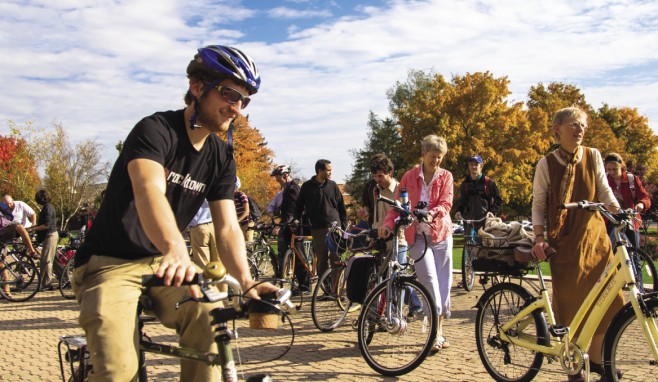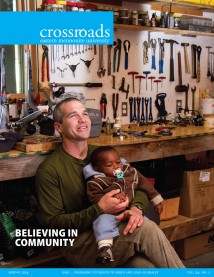
Faculty, staff and students wheel off Thomas Plaza after celebrating EMU’s latest award in national collegiate contests for being bicycle friendly. (Photo by Jon Styer)
In 2010 , a new class made its first appearance in EMU’s course catalog: bicycle maintenance, taught by Ben Wyse ’99. That was the same year that the university cooperated with the City of Harrisonburg to paint bike lanes along Park Road through campus, while Bible and religion professor Peter Dula ’92 helped a group of students found EMU’s bike coop, an outfit that rents, repairs and generally promotes biking to anyone on campus.
These and other examples of the growing stature of bikes and biking on EMU’s campus have more recently attracted attention from off-campus groups. In the fall of 2012, the League of American Bicyclists made EMU just the third university in the state to win a “bicycle friendly campus” designation. The following spring, EMU learned that it won the “small university” category of the National Bike Challenge – a contest in which groups earn points based on how far and often participants ride bikes (19 EMU faculty and staff members participated, logging a collective 9,412 miles).
EMU’s first bicycle maintenance class was a full-blown, three-credit affair (now scaled down to just one credit) that went well beyond mechanics. “We learned about many complex issues related to cycling and community organizing,” recalls Ben Bailey ’13, now an assistant manager at Rocktown Bicycles, one of several bike shops in Harrisonburg.
“We tried to use the coop and the class as a springboard into community advocacy,” says Dula.
As a result, a growing number of students began looking beyond campus to become more involved in the active biking scene in and around Harrisonburg, billed as the “bike capital of Virginia” for the fantastic mountain and road biking opportunities within easy reach of the city. In the past several years, Dula and a number of students have ridden in events like the Shenandoah Mountain 100 – a 100-mile mountain bike race held west of town – and spent many hours volunteering with advocacy groups, trail-building projects and other biking events. “We really love to ride our bikes, not just get other people to ride them,” Dula notes.
One of those outside efforts with closest ties to EMU is the development of a new, 2.5-mile walking and biking path, called the Northend Greenway, which will connect campus to downtown Harrisonburg. Planning for the path began in 2010 (building on similar efforts dating back at least a decade), when a small group of concerned citizens, including Lars Åkerson ’08, began talking about how to build a multi-use path, mostly following Blacks Run through the north side of town.
“From the beginning, the Northend Greenway wasn’t only about bikes. Bikes brought us together, but the Northend Greenway was an opportunity to develop a ‘linear park’ that would not only connect neighborhoods, but connect neighbors,” says Åkerson, who later stepped down from the steering committee when he left town for graduate school.
Among the neighborhoods the Greenway will more closely connect is a low-income residential area on the north side of downtown to EMU and to the Virginia Mennonite Retirement Community. Stephen Godshall ’92, another former member of the steering committee, looks forward to the path providing a new opportunity for his and other families to bike with their children. Godshall, a family practice doctor, is also eager to see the greenway provide people with a safe, enjoyable place for exercise. *
By 2011, the city had endorsed the idea, and the Greenway’s leadership team redoubled its planning, fundraising and landowner outreach efforts. They now expect the path will be open to the public by 2015.
In the meantime, Godshall hopes that EMU will begin playing a bigger leadership role in making the Greenway become a reality.
“I would challenge EMU to be a little more involved,” he says. “It would be nice to see it take an even more active lead in promoting bicycle infrastructure.”
Bikes, say many of those who love them, are fundamentally sources of connection with the outside world and with other people, and in that sense, the more EMU does to encourage and support biking on and around campus, the better, stronger ties it will establish with the wider city.
“EMU, like any college, is separated a bit from the local community,” says Bailey, who developed a passion for biking as a student but, at first, “didn’t have connections outside of campus to people who were riding bikes.”
During his junior year, a job at a bike shop next to campus opened his eyes to the larger world of biking in Harrisonburg. For years, Bailey says, individual students at EMU like him have found their own ways into this wider biking scene; he hopes that the bike coop and class that began on campus when he was a student will help create a stronger institutional connection between EMU and everything else that makes Harrisonburg Virginia’s bicycle capital. (If he called the shots at admissions, he’d be making a much bigger deal about local biking).
Because the student body at any college is in constant turnover, another key bit of helping students on bikes more fully enjoy and participate in the life of this bike capital is the support of older, more experienced bikers. When Bailey was a student, Dula and Wyse were very influential in getting him involved beyond campus. Now that he’s graduated and moved on to a job in the biking world they helped him discover, he’d like to do what he can to make that same process even easier for students now and in the future. One of his first steps: returning to campus in the spring of 2014, as Wyse’s co-teacher of the bike maintenance class that played such a heavy influence on Bailey just a few years earlier.
— Andrew Jenner ’04
* Others from EMU who have had prominent involvement in the Greenway include Jakob zumFelde ’11, a former engineering intern, Nicholas Detweiler-Stoddard ’07, MDiv ’12, its first fundraising and outreach coordinator, SPI associate director Nathan Musselman ’00 and Kevin Burnett ’03, both steering committee members, and numerous representatives of the Greenway’s advisory board.
